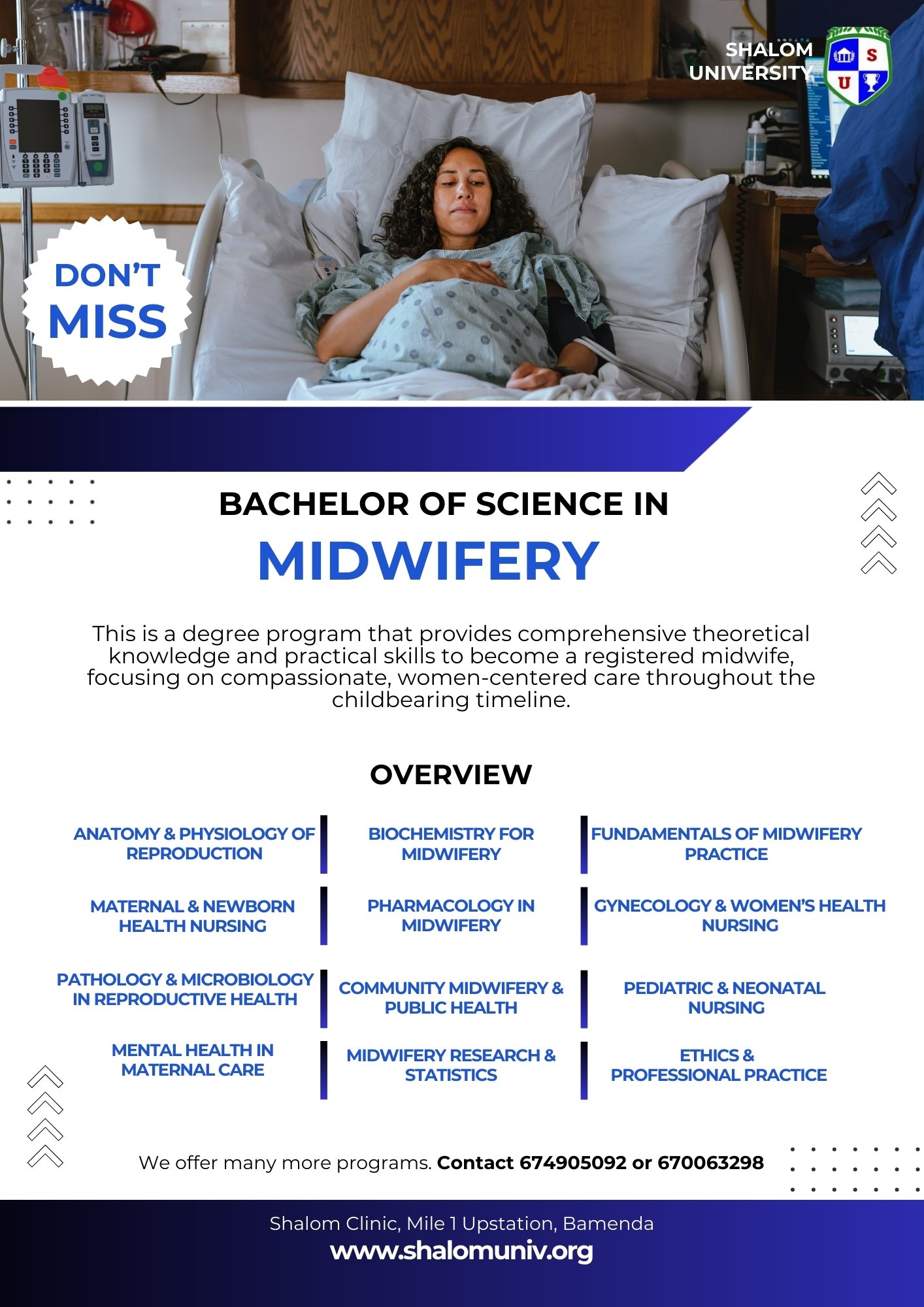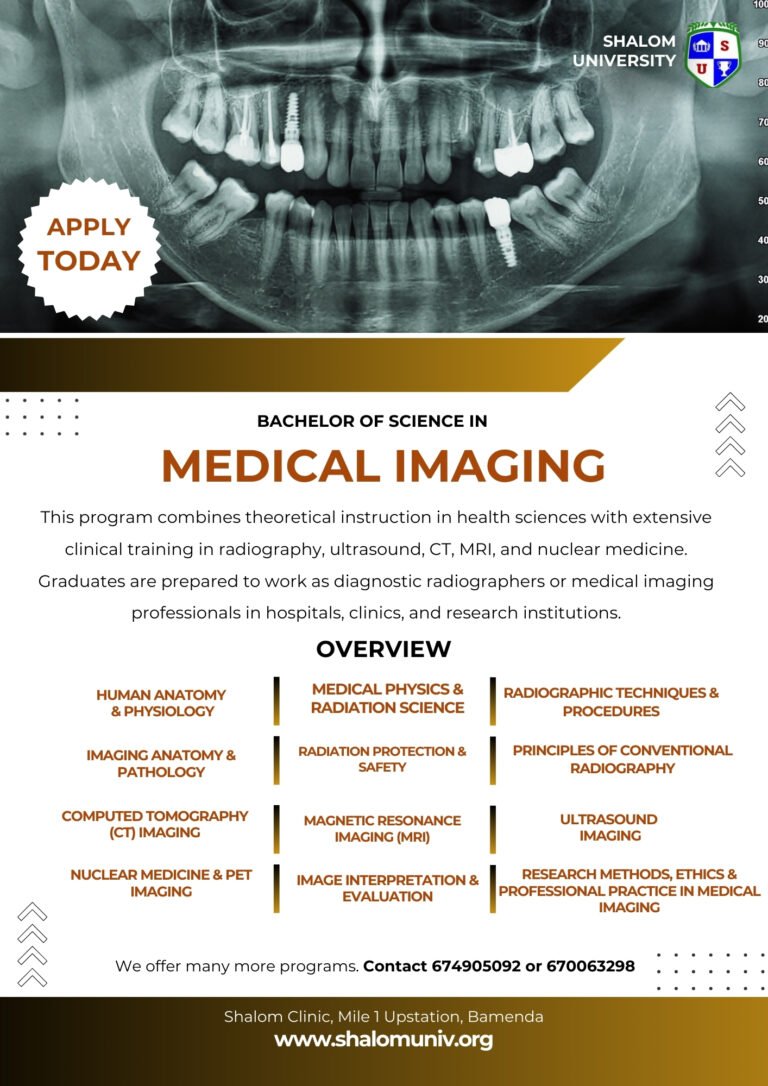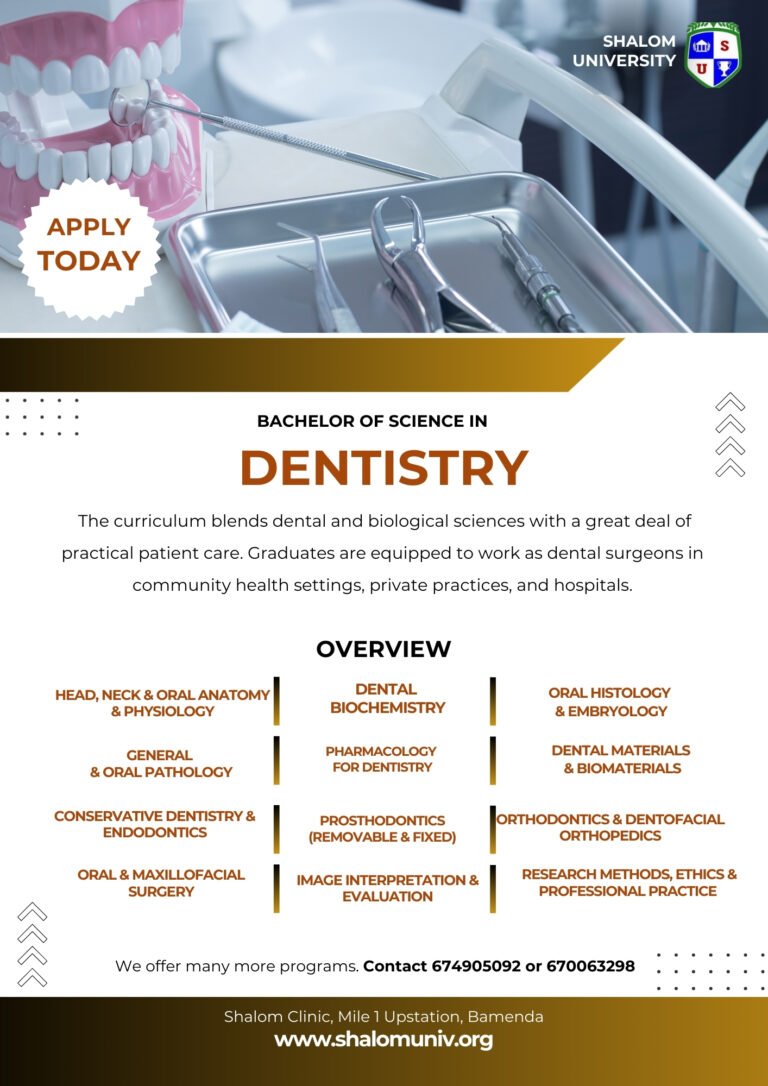Midwifery is one of the oldest and most respected professions in healthcare. It plays a central role in maternal and newborn health, ensuring safe pregnancies, skilled deliveries, and quality postnatal care. At Shalom University, the Bachelor of Science (BSc) in Midwifery is a transformative program that blends theoretical knowledge, clinical skills, and research-based practice. This degree equips students to become competent midwives who provide holistic, patient-centered care to women, infants, and families.
Shalom University’s BSc in Midwifery is not only designed to prepare graduates for professional clinical practice but also to develop leaders in women’s health, community health advocates, and researchers who contribute to advancing maternal healthcare globally.
This article explores the course structure, specialized subjects, and career impact of the program while maintaining an SEO-friendly structure optimized for learners and prospective applicants.
Anatomy & Physiology of Reproduction
This foundational course introduces students to the biological systems involved in human reproduction. Students explore the female and male reproductive systems, hormonal regulation, conception, embryology, fetal development, and maternal physiology during pregnancy. With this strong anatomical and physiological foundation, future midwives are equipped to understand normal pregnancy processes and identify deviations that may require medical intervention.
Biochemistry for Midwifery
Midwifery practice requires an understanding of the biochemical processes that influence reproductive and maternal health. This course explores cellular metabolism, enzymology, hormonal interactions, and molecular pathways relevant to pregnancy and lactation. Students gain insights into how nutrition, genetics, and biochemical imbalances affect maternal and newborn outcomes.
Fundamentals of Midwifery Practice
Here, students are introduced to the core principles, skills, and competencies of midwifery. The module emphasizes safe and evidence-based practices, antenatal care, labor management, delivery techniques, and postpartum care. Practical sessions in simulation labs and clinical placements allow students to translate theory into real-world patient care.
Maternal & Newborn Health Nursing
This course focuses on comprehensive care for mothers and newborns before, during, and after delivery. Students learn best practices for labor support, postpartum care, breastfeeding promotion, newborn assessments, and early interventions in neonatal complications. Special emphasis is placed on reducing maternal and neonatal morbidity and mortality rates, aligning with global health goals.
Gynecology & Women’s Health Nursing
Midwives are not limited to childbirth alone; they play an important role in women’s health across the lifespan. This subject covers gynecological disorders, family planning, reproductive health rights, and preventive care. Students gain the expertise to provide culturally sensitive, gender-responsive, and patient-centered care in various healthcare settings.
Pharmacology in Midwifery
Safe medication administration is a crucial part of midwifery. This module equips students with knowledge of pharmacokinetics, pharmacodynamics, drug safety, contraindications, and dosage calculation in reproductive health. Special focus is placed on drugs commonly used in obstetrics, including oxytocics, analgesics, antibiotics, and emergency medications.
Pathology & Microbiology in Reproductive Health
Infections and pathological disorders can complicate pregnancy and childbirth. Students learn about microbial pathogens, disease mechanisms, and reproductive pathologies. The course also emphasizes infection prevention, diagnostic testing, and treatment strategies, enabling midwives to protect mothers and newborns against preventable conditions.
Community Midwifery & Public Health
Midwives are essential frontline workers in communities. This course emphasizes public health principles, community outreach, epidemiology, and preventive care. Students are trained to engage with communities, educate families, and promote maternal health initiatives. They also explore global health challenges, including maternal mortality reduction and universal access to midwifery services.
Pediatric & Neonatal Nursing
Pediatric and neonatal care is a vital component of midwifery. This course covers infant development, pediatric illnesses, neonatal intensive care, and vaccination programs. Students learn how to provide compassionate, evidence-based care to children, from newborns to young adolescents, with an emphasis on early detection and intervention.
Mental Health in Maternal Care
Pregnancy and childbirth significantly impact a woman’s mental well-being. This course highlights the importance of psychological support, counseling, and care for women experiencing postpartum depression, anxiety, or trauma. Midwifery students are trained to identify mental health issues early and collaborate with multidisciplinary teams for comprehensive maternal care.
Midwifery Research & Statistics
Evidence-based practice is the cornerstone of modern healthcare. Students gain research skills, including study design, data collection, statistical analysis, and critical appraisal of scientific literature. This empowers graduates to contribute to maternal and newborn health research, influencing policies and practices at both national and global levels.
Midwifery Ethics & Professional Practice
Ethics and professionalism are at the heart of healthcare. This course emphasizes ethical decision-making, legal frameworks, patient rights, cultural sensitivity, and professional accountability in midwifery. Students are prepared to uphold the highest ethical standards while navigating complex situations in reproductive healthcare.
Career Opportunities with a BSc in Midwifery from Shalom University
Graduates of the BSc in Midwifery at Shalom University are highly sought after in hospitals, maternity clinics, community health centers, NGOs, and international health organizations. Career paths include:
- Registered Midwife in hospitals and maternity wards
- Community Health Advocate in rural and underserved areas
- Maternal & Child Health Specialist with NGOs and international agencies
- Public Health Midwife focusing on policy and preventive health programs
- Academic or Research Midwife contributing to teaching and evidence-based practice
Additionally, the degree lays the foundation for advanced studies, such as Master’s programs in Nursing, Midwifery, or Public Health.
Why Choose Shalom University for Midwifery?
- Globally relevant curriculum aligned with World Health Organization (WHO) standards.
- Experienced faculty with expertise in clinical midwifery and public health.
- Practical exposure through community outreach programs and clinical placements.
- Research opportunities that prepare students to influence global maternal health policies.
- Commitment to SDG 3 (Good Health and Well-being) and SDG 5 (Gender Equality) through maternal and reproductive health education.
By choosing Shalom University, students become part of a transformative learning journey that prepares them to save lives, empower women, and strengthen communities.
Frequently Asked Questions (FAQ)
Q1: What is the duration of the BSc in Midwifery program at Shalom University?
A: The program typically spans four years of full-time study, including coursework, laboratory training, clinical rotations, and community health practice.
Q2: Can international students apply for the BSc in Midwifery at Shalom University?
A: Yes, Shalom University welcomes both local and international applicants who meet the admission requirements.
Q3: What are the entry requirements for the program?
A: Applicants should have a high school certificate with a science background (biology and chemistry preferred) or an equivalent qualification. Additional requirements may apply for international students.
Q4: Does the program include practical clinical training?
A: Yes, students gain hands-on experience through clinical placements in hospitals, maternity wards, and community health centers, ensuring they are job-ready at graduation.
Q5: What makes Shalom University’s Midwifery program unique?
A: The program integrates global health perspectives, ethical practice, research skills, and community engagement, making it one of the most comprehensive midwifery programs in the region.
Q6: What career options are available after graduation?
A: Graduates can work in hospitals, public health organizations, NGOs, and research institutions or pursue further studies in advanced nursing, public health, or maternal care.
For more details, visit the official program page: BSc in Midwifery at Shalom University.
Final Thoughts
The Bachelor of Science in Midwifery at Shalom University is more than a degree—it is a commitment to improving maternal and newborn health. Through a strong blend of science, clinical practice, research, and community engagement, the program prepares graduates to make a lasting impact on the lives of women and children across the world.
If you are passionate about empowering women, promoting safe childbirth, and advancing global maternal health, then this program is the ideal pathway for your future.




